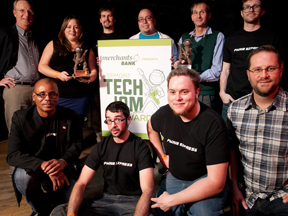
Former Merchants Bank President and CEO Mike Tuttle with 2013 Tech Jam award winners from Pwnie Express and FreshTracks Capital (File photo)
Protecting customer and employee data against cyber attacks is increasingly challenging. That’s bad news for the government and for corporate America, but good news for Boston-based Pwnie Express.
The cybersecurity firm, which also has an office in Burlington, just announced that it’s raised $12.9 million in venture capital. The cash will help the company expand its efforts to help customers prevent hackers from gaining access to sensitive data.
Those customers include companies facing the growing threat of attacks from mobile devices and the expanding Internet of Things — in which sensors and previously offline appliances connect to household and corporate networks.
A growing reliance on workplace “Bring Your Own Device” policies is also cause for concern. “Most organizations are starting to worry about that as a new attack vector,” says Pwnie Express CEO Paul Paget. “If you don’t know what [the devices] are, and they’re connecting to your networks, that creates risk.”
Paget sees opportunity there, particularly among small and mid-size businesses that need help adapting to this rapidly changing environment — perhaps from Pwnie’s new, real-time wireless and wired detection tool, Pwn Pulse. “We think that’s a huge market,” he says. Pwnie’s investors agree — hence the new infusion of funds. In a phone interview, Paget outlined how the investment will help the company grow — in both Boston and Burlington, Vermont.
Despite being headquartered in Massachusetts, Pwnie’s roots are in the Green Mountain State. Vermonter Dave Porcello founded the company in 2010; its name comes from the hacker term “pwn” — rhymes with “own” — which means to own someone’s computer. Pwnie grew here from a single employee to a small team. In 2013, after raising $5 million in its first round of funding, it moved its official HQ to Boston, and Paget came aboard as CEO.
Back then, says Paget, it might have seemed that Pwnie would simply relocate to Boston. “I think a lot of people thought that, the handwriting’s on the wall, the company’s going to move in that direction,” he says.
But it hasn’t. Today a quarter of the company’s 40 employees work out of an office in the Karma Bird House in Burlington. Paget says his BTV employees are mainly software engineers, many of whom have graduated from local schools such as the University of Vermont, Champlain College, and Saint Michael’s College. He says he plans to add employees in Boston, and three or four new employees in Burlington in 2016.
Paget notes that certain positions in marketing and finance are easier to fill in Boston, but he says it’s actually easier to find and keep software engineers in Burlington. In Boston, Pwnie is constantly competing with new startups. There’s competition in Burlington, too, he says, but not as much. And the people in Vermont, who like biking to work and the overall quality of life here, tend to stick around.
The teams collaborate using Google Hangouts, and they interact in person every few months. Getting both groups together in person is really important, according to the CEO. “You can have all the technology in the world,” he says. “If people don’t bond with each other, they won’t work together.”
Paget says Pwnie’s Boston-based employees enjoy having the opportunity to visit the Burlington campus, and vice versa. “We think we’ve got a Boston-Burlington thing going on that’s pretty unique, and we’re proud of that.”
David Bradbury, president of the Vermont Center for Emerging Technologies, is happy about it, too. VCET has worked closely with Pwnie over the years, “since founder Dave Porcello called very late in the day one Friday afternoon seeking advice on starting this new business,” writes Bradbury in an email. VCET’s Vermont Seed Capital Fund is an investor.
Bradbury notes that Pwnie’s continuing Vermont connection has benefitted other local entities, including Norwich University — the company worked with Norwich to detect threats to this year’s Super Bowl, for example. Pwnie currently sources hardware from South Burlington-based Logic Supply. Paget also says the company has recently contracted with New Breed, a marketing agency in Winooski.
Mike Schirling, executive director of the economic development initiative BTV Ignite, says Pwnie’s Boston-Burlington strategy isn’t actually all that unique. He’s heard of other companies employing similar approaches. “As Burlington’s innovation and technology economy and ecosystem continue to grow, we’re seeing a variety of deployment strategies embraced by tech firms,” he writes in an email. “Some, like Pwnie Express, are leveraging talent and assets in multiple locations simultaneously. Others are based in our area and have employees working remotely elsewhere or are based in other parts of the country or the world and have remote workers leveraging [Burlington’s] robust fiber infrastructure.”
Paget doesn’t name others, but says he’s talked with multiple CEOs about opening offices in the city. “I get asked about Burlington all the time,” he says. Would he welcome more companies looking to the city as a possible destination? “I do think it’s good for business and good for Burlington,” he says.
